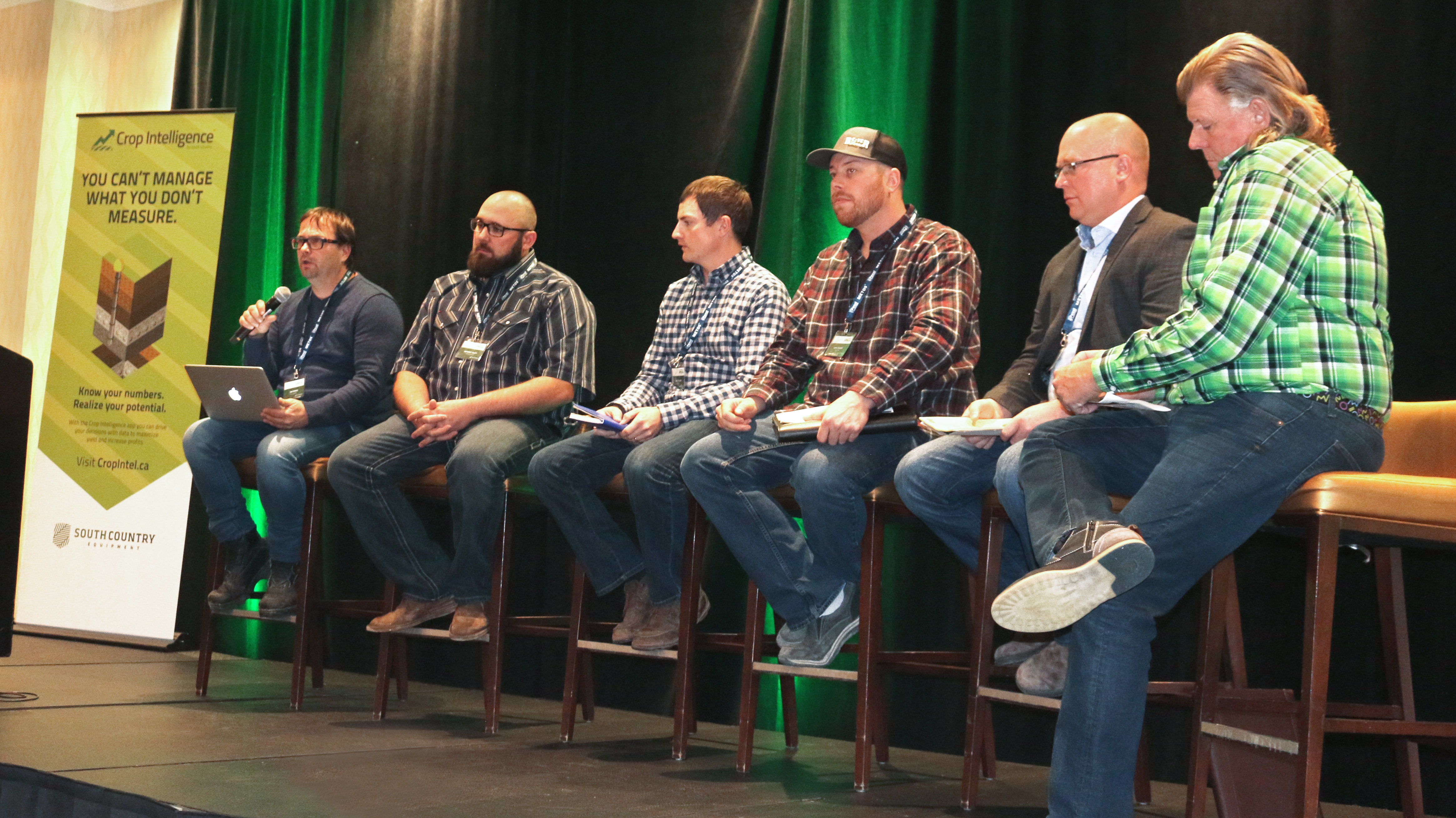Varying opinions on farm data, plans to further leverage their Crop Intelligence networks and proven game changers were all revealed at the Crop Intelligence Annual Summit.
The Farmer Panel highlighted innovative producers from across Western Canada and the strategies they have adopted to stand out as some of the best in the industry. It featured Jake Leguee from South Saskatchewan, Ron Krahn from Manitoba, Anthony Plett from Alberta, Ben Cavers from South Saskatchewan and Tom Senko from Central Saskatchewan.
Q: What is the best piece of farm advice you have ever been given?
- Krahn’s advice was to never do a deal that isn’t a win-win for both parties. He added that it needs to be beneficial for both sides, or the deal will never happen again.
- Senko’s received advice early on that put things in perspective for him; “Rome wasn’t built in day.” He had asked a successful, older neighbor how he ran his operation and his answer was that it didn’t happen overnight. He explained that it takes a long time to pay off those first pieces of land—but if any farmer keeps working at it and stays dedicated, the farm operation will come together in time.
Q: What is an example of the value Crop Intelligence has brought to your farm?
- Plett revealed that, due to the data provided by Crop Intelligence, he pulled triggers on his farm even though everyone thought it was dry. He ended up with a 20% yield increase with high protein.
Q: 2019 was a difficult year for farmers in Western Canada. How did you and your family or staff deal with this challenging year?
- Krahn made an effort to ensure he was getting enough sleep whenever he could. Sleep was essential for his stress management. The days when he wasn’t able to harvest because it was raining, he made sleep a priority so that, when it was go-time, he was rested and ready to work.
- Leguee focused on being present with his family. It was the silver-lining to a sub-par harvest. He shared that his kids didn’t understand that rain was a bad thing at harvest—for them, it just meant they got to spend the day with their dad.
- Senko added that “The Howard Stern Show” podcast is always great for a good laugh to help him get through the tough times.
Q: How do you think you will expand, fine tune, or further leverage your Crop Intelligence network in the near future?
- Krahn said he would use the network to manage his in-season risk. He added that accurate weather forecasting is a next important puzzle piece.
- Ben Cavers plans to use his network to help him make earlier marketing decisions. He will be adding a few more probes to cover some additional acres.
- Leguee also intends to add a few more probes to cover his geography. Nutrient management decisions have been a focus, he explained that they started working with melted urea in 2019. Now that they are set up for next year they want to explore later nitrogen applications to optimize protein content as well as do some more work with micronutrients.
- Plett plans to add more probes to his land to increase his accuracy across other regions of his farm.
- Senko explained that he has been working with weather stations since 2015, and Crop Intelligence since 2017. Because he’s had experience, his focus is now on fine-tuning and maybe adding one more probe. He’s found that variable weather can really cause an impact across his farm and that the field variability is more than he had ever anticipated.
Q: What has been a recent game changer for your farm?
- Plett found that using section control has brought a huge amount of savings and efficiency to his farm—including 17% savings on seeding inputs.
- Leguee explained that setting up a farm office has brought efficiencies and professionalism to his team’s operation. Last year, they brought an old ATCO trailer in, which they set up with a boardroom, a kitchenette and a couple of offices. It helped them shift their mindset from viewing the farm as a lifestyle to viewing it as a business.
- Cavers began working with Granular Ag software. With this program, his team made a big shift to doing something with all the data they collect on the farm. He explained that they do their profit analysis on a per field basis and highlight the wins to get a clear picture of their cost of production.
- Krahn added that he joined a farm networking group that runs a continuous WhatsApp chat. It has become a sounding board where he can bounce ideas off a group of peers and get new ideas for his farm.
Q: What makes you most nervous or excited about big data and farm technology advancement?
- Krahn shared that he thinks farmers are giving away their data for nothing in return and believes that farmers need to proceed carefully when data is concerned. He cautioned Crop Intelligence to be very transparent about who they are sharing their data with and added that farmers should have the right to keep their data to themselves.
- Leguee agreed with the idea that farmers should retain the ownership of their data but believes there is a huge opportunity that comes with the increase of farm data.
- Senko and Cavers viewed these advancements as a positive.


